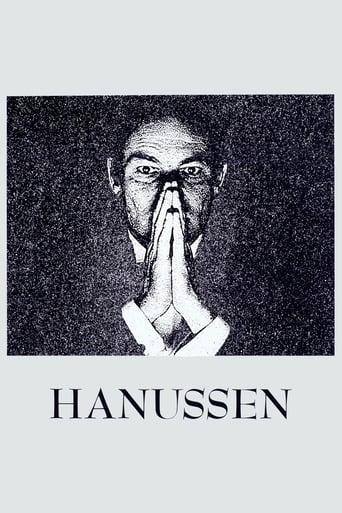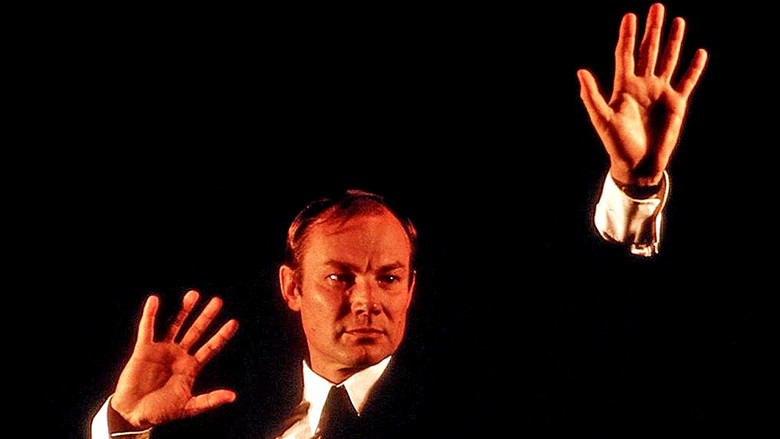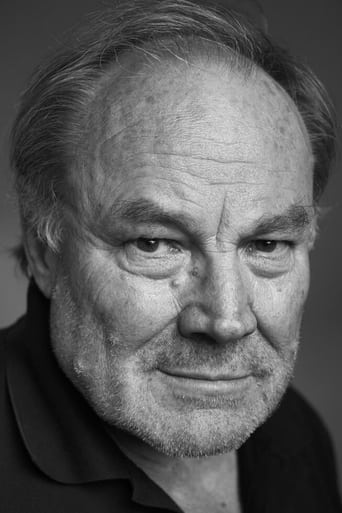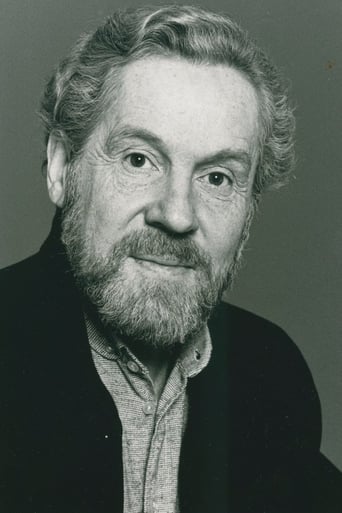Hanussen (1988)
A man's story parallels Hitler's rise. Austrian Klaus Schneider, wounded in World War I, recovers in the care of Dr. Emil Bettleheim. Bettleheim discovers that Schneider possesses powers of empathy and of clairvoyance, such that could aid suicidal patients. After the war, with one friend as his manager and another as his lover, Schneider changes his name to Eric Jan Hanussen and goes to Berlin, as a hypnotist and clairvoyant performing in halls and theaters. He always speaks the truth, which brings him to the attention of powerful Nazis. He predicts their rise (good propaganda for them) and their violence (not so good). He's in pain and at risk. What is Hanussen's future?
Watch Trailer
Free Trial Channels
Cast


Similar titles


Reviews
a film so unique, intoxicating and bizarre that it not only demands another viewing, but is also forgivable as a satirical comedy where the jokes eventually take the back seat.
This is a must-see and one of the best documentaries - and films - of this year.
It's a good bad... and worth a popcorn matinée. While it's easy to lament what could have been...
This is a small, humorous movie in some ways, but it has a huge heart. What a nice experience.
A German soldier with a serious head wound survives The Great War to become a celebrated clairvoyant in Depression-era Berlin, mesmerizing audiences (and critics) by the sheer force of his personality. No, his stage name isn't Adolph Hitler, but the parallels soon become clear. Are his powers a supernatural gift or merely sensitive guesswork? The question takes on added significance when the apolitical showman begins predicting the rise of fascism and falls under the influence (against his own will) of the fledgling Nazi Party. The film presents an intriguing, if not always cohesive, portrait of an entertainer (and by extension, a nation) under the spell of forces beyond anyone's control, with the title role coming vividly to life in Klaus Maria Brandauer's equally mesmerizing performance. His efforts helped earn the film a nomination for Best Foreign Language Feature, but the results were likely too dark and ambiguous to win the Oscar.
Having seen the two first films of Szabo-Brandauer's trilogy, I felt exceptionally curious to see HANUSSEN, perhaps the least popular of these but very attractive as for the content. And when I at last got an opportunity to see this film, I immediately noticed the mature Szabo directing style that seems to be addressed rather to adult viewers. What is so special about this very style that is ever present in MEPHISTO, OBERST REDL and here? It's almost deprived of effective visuals being supplied with the typical themes concerning the fear of future, contradictions of a self, nonsense of politics, problem of selfishness, power of propaganda, finally a personal tragedy in a diversely brutal world. Yet, there is something that appears to be unique for HANUSSEN...the main character.Though Klaus Schneider or Eric Jan Hanussen (Klaus Maria Brandauer) also goes through an individual drama, he is different than Mephisto or Redl were. He is not an actor whom people like for talent and wit, he is not a soldier whom the military and governing powers reward, he is a magician, a hypnotist, a "prophet" who can predict everything, who is able to look at people's faces and read their minds. Yet, like with the two previous characters, at the moment he becomes a popular figure the politics steps in and controls the life of the character no matter if he wants this or not...Since the film has much to do with magic and unreal events combined with hypnosis, the events might seem unconvincing for many of us. Transfer of will, oriental elements, hidden power, symbols of magic...these all do not appeal to me whatsoever. At the same time, this film is not for youngsters or children but only for adult viewers due to its sophistication and immorality, including nudity. However, what we get at the beginning and at the end of the movie is the Lord's Prayer. It seems that only in the most important, crucial moments of life, people turn to the only God they have in their hearts. However, someone may cope with one significant dilemma: can we combine Christianity with magic? The director does not seem to bother answering for that question. He rather focuses, like in his previous films, on a person in the world, on a life among many lives: so unique, so irreplaceable, so much filled with contradictions, so weak and unstable. And that is something I'd like to analyze in more details.Istvan Szabo, to the very core, provides us with an insight into the sadness, hypocrisy of the reality we live in. Why are the people so much into magic? Because they have unstable lives. Magic attracts them because it may tell them something they do not find in a regular routine of everyday life. They love Hanussen because it is him who predicts the unexpected stock exchange prices of cotton, it is him who tells the fate of the American ship, it is him who predicts the reign of Hitler and his pack of bandits. Finally, it is him, this time so uncomfortable, who predicts the burning of Reichstag. Therefore, illusively, people love him in spite of the fact that there is also a propaganda around his personality; they love him because he can partly ease their fear of tomorrow, he can give them an answer while the rest of the world remains mute.The performances are fine but one performance is a marvel...it's Klaus Maria Brandauer's. I am not going to compare his portrayal to his previous ones in Szabo's films. They were all very good. However, one fact has to be mentioned. It is in HANUSSEN where one realizes that Brandauer was really born for these roles. His Hanussen is a quintessential of what Szabo wanted to convey in his films. He reaches the climax here. Unforgettable moments! Consider, for instance, one of his most powerful moments when he (Klaus Schneider) stops a patient in hospital from suicide. This is also a critical moment in the whole movie because then the main character finds himself as a hypnotist and people find this talent in him. Other cast include Erland Josephson as Dr Bettelheim and Adrianna Biedrzynska as Wally. Meaningful that Szabo twice cast a Polish actress as the main character's woman (Krystyna Janda in MEPHISTO and Adrianna Biedrzynska here). She is not Janda but does a fine job, too.All in all, HANUSSEN, though a very difficult movie, appears to be a significant work: thought provoking, individual one. Yet, it should be seen after MEPHISTO and OBERST REDL. Then, the movie makes the desirable sense. It is simply a harmony of Szabo's with Klaus Maria Brandauer in the lead and their pretty pessimistic message about life and reality.
István Szabó is one of the best directors in Europe. He doesn't use any special effects, only unusual, demanding stories and Europe's best actors. He is an international director but he never forgets that he is actually Hungarian and there are always some Hungarian speaking people in his movies.In "Hanussen" he tells the very gripping story of a man who predicts Hitler's advancement. It was a most interesting film and I was a bit disturbed afterwards because they didn't make it quite clear whether it's based on a true story or not.However, watch this movie. It's also a great performance by Klaus Maria Brandauer.
This is the story of the fatal hubris of an artist who vainly tries to maintain neutrality in the face of encroaching Nazism, in order to pursue his brilliant career as a hypnotist and magician. The suspense grows unbearable as the perverse evil intrudes into every aspect of life.There are wonderful examples of the way the Hitler's propaganda machine co-opts everything in sight, and how people underestimate, over and over again, the lengths he will go to. The character of Bruno Bettelheim, with a clear, humane view of life, appears as a foil to the protagonist who is seduced by his 'art'. I really liked the irony of the man who predicts the future, coming up against his own unrolling fate, as becomes clear in the last, most sinister scene.This is my favorite of the three Istvan Szabo movies about protagonists trying to control their fate in the web of intrigue of a totalitarian state. It is exciting and provocative.
















